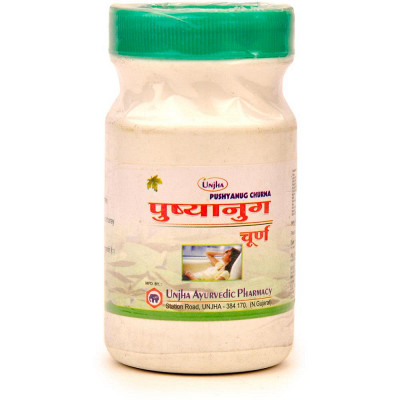About Unjha Pushyanug Churna
Unjha Pushyanug Churna is an Ayurvedic formulation referenced from Ayurvedic treatise Bhaishajya Ratnavali, and is indicated in Stri-rogadhikar or gynaecological conditions. Pushyanug Churna is use in the treatment and strengthening of the females internal organs of women. The internal organs like Uterus, Vagina of women are the most sensitive parts of the body. These sensitive parts are always subjected to intense pressure due to various types of working pressures. These loads that could vary from individual to individual.
The loads that acts on the woman’s’ internal organs causes many weaknesses in these organs. The weaknesses that generate form inside tend to make a woman prone to various diseases.Pushyanug Churna is astringent, pungent, sweet and bitter in taste. It is warm in potency. It calms vata, pitta and kapha. It works on plasma, blood, muscles and reproductive system.
Ingredients of Unjha Pushyanug Churna
- Patha Cyclea peltata
- Jambu-bija majja Eugenia jambolana
- amra-bija majja Mango
- Pashan bheda
- Daruharidra
- Ambasthaki Cissampelos pareira
- Mocharasa (Shalmali) Salmalia malabarica
- Lajjalu
- Padma kesara (Kamala) Nelumbo nucifera
- Vahlika (Kumkuma) Crocus sativus
- Ativisa Aconitum heterophyllum
- Musta
- Bilva
- Lodhra
- Gairika
- Katphala
- Maricha
- Sunthi
- Draksha
- Rakta candana Pterocarpus santalinus
- Katvanga (Araluka) Oroxylum indicum
- Vatsaka (Kutaja) Holarrhena antidysenterica
- Ananta Hemidesmus indicus
- Dhataki Woodfordia fruticosa
- Mulheti Glycyrrhiza glabra
- Arjuna Terminalia arjuna
Benefits of Pushyanug Churna
Gynaecology
Pushyanug churna is indicated for all female menstrual disorders involving congestion in the artavasrotas (female reproductive channel). Conditions involving excessive bleeding such as metrorrhagia, fibroid and endometriosis are treated with this formula. Excess water stagnation with uterine tumours, ovarian cysts and leucorrhoea are dried up and reduced. Dysmenorrhoea due to high pitta and kapha is regulated as the obstruction causing the pain is removed. Menstrual irregularities such as mid-cycle bleeding and perimenopausal flooding are normalised. All inflammations and irritations, such as in thrush and vulvodynia, are treated.
Pregnancy
With a restless fetus and mid-term bleeding pushyanug churna is indicated. It is also of great benefit post-partum to astringe the uterus muscles and purify the stanya srotas (lactation channel). Blood Conditions involving excess bleeding, especially from the bowel and urinary system, are astringed and rectified. It specifically focuses on rakta dhatu, and the reckless movement of blood flooding out of its channel is addressed by reducing the stagnation that is causing the overflow. The blood nourishing action of the herbs help to treat anaemia. As a vasoconstrictor it tonifies the capillaries and assists the relaxation–contraction cycle in the capillary beds.
Blood
Conditions involving excess bleeding, especially from the bowel and urinary system, are astringed and rectified. It specifically focuses on rakta dhatu, and the reckless movement of blood flooding out of its channel is addressed by reducing the stagnation that is causing the over-flow. The blood nourishing action of the herbs help to treat anaemia. As a vasoconstrictor it tonifies the capillaries and assists the relaxation–contraction cycle in the capillary beds.
Nerves
Irritations of the nervous system causing pain and uterine spasms are soothed.
Precautions of Pushyanug Churna
- Over use of this medicine for a very long period of time may result in irregular menstruations.
- It is best to take this medicine during the period of excessive discharge and during menorrhagia.





